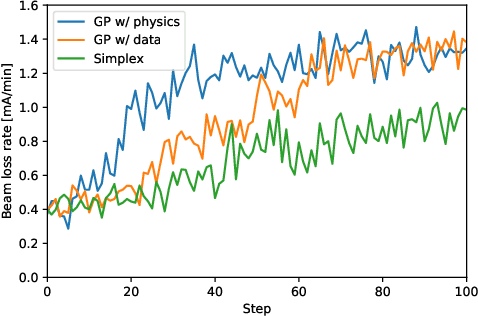A. Hanuka
Accurate and confident prediction of electron beam longitudinal properties using spectral virtual diagnostics
Sep 27, 2020



Abstract:Longitudinal phase space (LPS) provides a critical information about electron beam dynamics for various scientific applications. For example, it can give insight into the high-brightness X-ray radiation from a free electron laser. Existing diagnostics are invasive, and often times cannot operate at the required resolution. In this work we present a machine learning-based Virtual Diagnostic (VD) tool to accurately predict the LPS for every shot using spectral information collected non-destructively from the radiation of relativistic electron beam. We demonstrate the tool's accuracy for three different case studies with experimental or simulated data. For each case, we introduce a method to increase the confidence in the VD tool. We anticipate that spectral VD would improve the setup and understanding of experimental configurations at DOE's user facilities as well as data sorting and analysis. The spectral VD can provide confident knowledge of the longitudinal bunch properties at the next generation of high-repetition rate linear accelerators while reducing the load on data storage, readout and streaming requirements.
Online tuning and light source control using a physics-informed Gaussian process Adi
Nov 04, 2019
Abstract:Operating large-scale scientific facilities often requires fast tuning and robust control in a high dimensional space. In this paper we introduce a new physics-informed optimization algorithm based on Gaussian process regression. Our method takes advantage of the existing domain knowledge in the form of realizations of a physics model of the observed system. We have applied a physics-informed Gaussian Process method experimentally at the SPEAR3 storage ring to demonstrate online accelerator optimization. This method outperforms Gaussian Process trained on data as well as the standard approach routinely used for operation, in terms of convergence speed and optimal point. The proposed method could be applicable to automatic tuning and control of other complex systems, without a prerequisite for any observed data.
 Add to Chrome
Add to Chrome Add to Firefox
Add to Firefox Add to Edge
Add to Edge